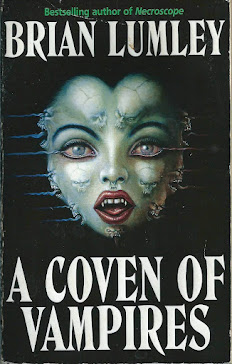3 / 5 Stars
'Nightmares' (256 pp.) was released by Playboy Books in September 1979; the cover artwork is by Alfred Pisano.
According to editor Grant, about half of the entries were written specifically for this anthology. The remainder are tales that were first printed in various 'slick' and digest magazines throughout the 70s.
Charles L. Grant (1942 - 2006) was of course one of the leading practitioners of 'Quiet Horror' in the interval from the late 70s to the late 90s. I always was underwhelmed by Grant's stories, and those of the other Quiet Horror authors that he routinely selected for his anthologies (the 'Shadows' series comes quickly to mind).
[For an expanded take on Charles Grant's anthologies, readers are directed to the Too Much Horror Fiction blog.]
It goes without saying that Splatterpunks were not tolerated by Grant, and those purveyors of that genre during the 70s (James Herbert comes readily to mind) are absent from this volume.
'Nightmares' is actually a passable anthology. While certainly none of the stories would qualify as hardcore grue n' gore, most of the contributors avoid the Psychological Horror treadmill in favor of more imaginative takes on the horror genre. Whether this is because of Grant's editorial insistence, or happy chance, is unclear.
There are a number of short-short stories. 'Peekaboo' by Bill Pronzini, 'Unknown Drives' by Richard Christian Matheson, 'I Can't Help Saying Goodbye' by Anne Mackenzie, 'Mass Without Voices' by Arthur L. Samuels, 'The Anchoress' by Beverly Evans, and 'He Kilt It With A Stick' by William F. Nolan, all are competent exercises in surprise / shock endings.
Avram Davidson's 'Naples' is, as are all his stories, consciously 'literary', but its atmospheric setting and subdued, but effective, ending, makes it one of the best entries in the collection.
Steven King's contributions to horror anthologies in the 70s and 80s could be hit-or-miss. 'Suffer the Little Children', first printed in 1972, is one of his superior entries. It's an able depiction of unpleasant schoolkids.
Dennis Etchison, a dedicated practitioner of Quiet Horror, provides 'Daughter of the Golden West'. Dealing with high school boys looking into the fate of a missing comrade, 'Daughter' labors under Etchison's opaque prose style. But the tale's final page avoids the ambiguous, deliberately vague endings too common to Etchison stories. This also is one of the better entries in this anthology.
'The Duppy Tree', by Steven McDonald, is a novel take on Jamaica, and its folk mythology.
'Camps', by Jack Dann, involves a sickly man who has disturbing dreams about a concentration camp. It's an overly contrived effort to construct a psychological horror story around the theme of the Holocaust.
'The Night of the Piasa' by G. W.Proctor and J. C. Green, and 'Snakes and Snails' by J. C. Haldeman II, have a retro, Weird Tales - style pulp sensibility. The former story, in particular, suffers from amateurish prose.
Barry Malzburg's 'Transfer' is an overly wordy examination of the mind of serial killer.
'Fisherman's Log' by Peter D. Pautz, and 'The Ghouls' by R. Chetwynd - Hayes, take satirical looks at encounters with aquatic, and zombie, monster manifestations, respectively.
'Seat Partner' by Chelsea Quinn Yarbro is not even a horror tale, but rather, an opening chapter from one of her Count St. Germain novels. The inclusion of this fragment in the anthology is a mystery; it could have been that Yarbro was caught at deadline time with nothing ready for editor Grant (there was no such thing as email in 1979, so manuscripts had to be snail-mailed).
'The Runaway Lovers', a old (1967) tale from Ray Russell, is less horror, than a sardonic look at human foibles.
Inevitably for a 70s horror anthology, Ramsey Campbell is present and accounted for. 'Midnight Hobo' starts off well despite Campbell's clotted prose, and, somewhat surprisingly, maintains sufficient momentum to its last sentence to serve as a reasonably decent horror story.
Treasure it; rewarding Campbell pieces such as 'Hobo', are very few and far between.
Summing up, 'Nightmares' is a decent enough late-70s anthology of horror tales. There are some worthy entries here, that making trudging trough the subpar material worthwhile.

























